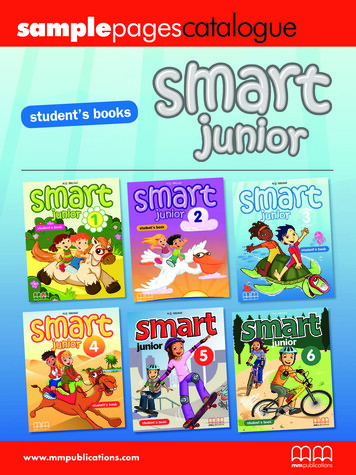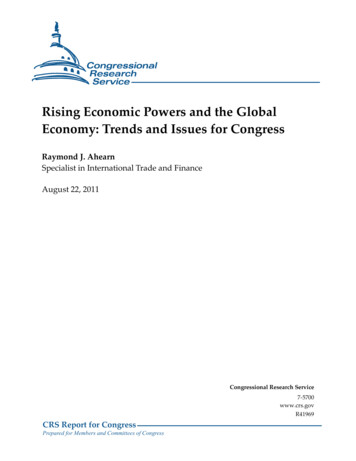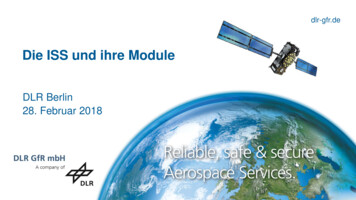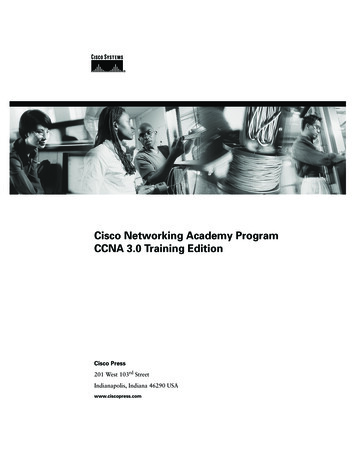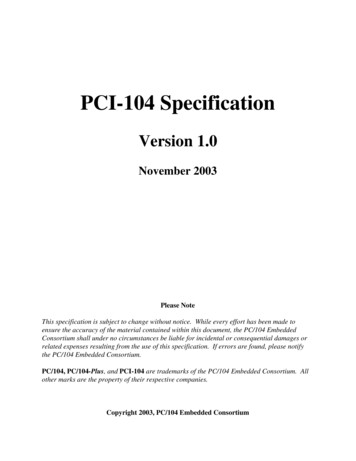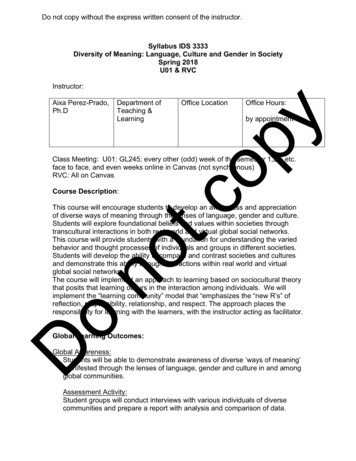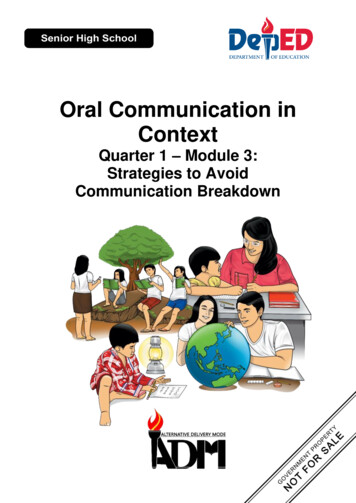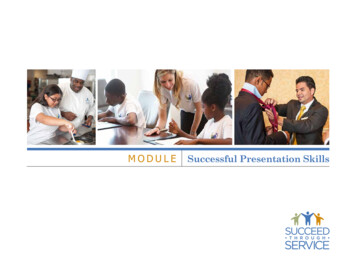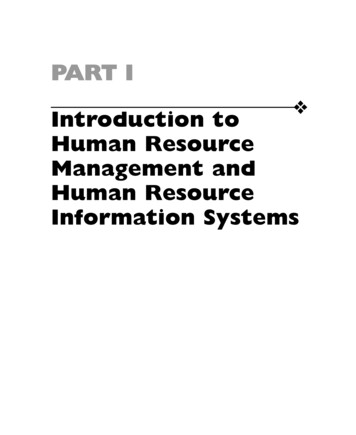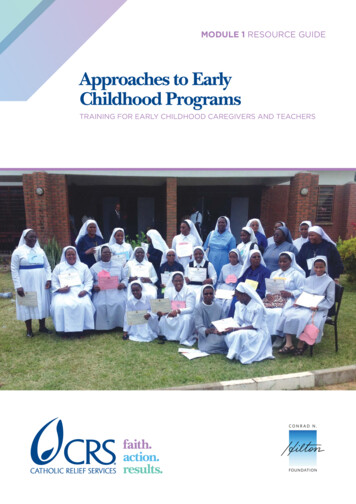
Transcription
MODULE 1 RESOURCE GUIDEApproaches to EarlyChildhood ProgramsTRAINING FOR EARLY CHILDHOOD CAREGIVERS AND TEACHERS
MODULE 1 RESOURCE GUIDEApproaches to EarlyChildhood ProgramsTRAINING FOR EARLY CHILDHOOD CAREGIVERS AND TEACHERSAPPROACHES TO EARLY CHILDHOOD PROGRAMSi
This guide is part of a series of manuals that focuses on six topics in EarlyChildhood Development (ECD): different programming approaches, basic concepts,assessments, early childhood environments, children with special needs and childprotection, and the health, safety and nutrition of young children. The series wasprepared within a three-year CRS-led project called “Strengthening the Capacity ofWomen Religious in Early Childhood Development,” or “SCORE ECD.” Fundedby the Conrad N. Hilton Foundation, the project helps Catholic sisters in Kenya,Malawi, and Zambia in their work with children aged 0-5 years and their families.The project is being implemented from January 2014 to December 2016.Written by Selamawit Tadesse, in cooperation with CRS SCORE ECD team.Edited by David SnyderCover photo: Master trainers with certificate of completion on early childhood development, Malawi, 2015Photo by Ministry of Gender, Children, Disability and Social Welfare, Government of Malawi/for CRS.Copyright 2016 Catholic Relief ServicesAny reproduction, translation, derivation, distribution or other use of this work is prohibited without theexpress permission of Catholic Relief Services (“CRS”). Please obtain permission from pqpublications@crs.org or write to:Catholic Relief Services228 West Lexington StreetBaltimore, MD 21201-3443 USA
Table of ContentsINTRODUCTION.VFOREWORD. XIIIRESOURCE GUIDE 1: APPROACHES TO EARLY CHILDHOOD PROGRAMS . 1Purpose.1Background.1SESSION 1: STANDARDS FOR QUALITY EARLY CHILDHOOD PROGRAMS . 3Learning objectives.3Evidence-based standards for quality early childhood programs.3National early childhood development policies .9Cross country ECD principles: Kenya, Malawi, and Zambia.9Definition of age group by country. 11Guiding principles for early childhood spiritual care and development. 11SESSION 2: UNDERSTANDING YOUNG CHILDREN .17Learning objectives. 17Overview of childhood development theories and their implicationsto practice. 17Understanding young children: Principles of child development and learning.22Fostering a developmentally and culturally appropriate experience foryoung children. 24Differences in development and learning: Infants, toddlers, andpreschoolers and what caregivers can do. 26SESSION 3: SUPPORTING CHILD DEVELOPMENT THROUGH HOLISTICAPPROACH AND PLAY.33Learning objectives. 33A holistic approach: Community mapping to address the essentialneeds of young children . 34The role of family, social, and community resources in promotingdevelopment of young children. 35Holistic approach to meet children’s essential needs: The case of Towela. 36Play and its importance in the learning and development of young children . 37REFERENCES.42APPROACHES TO EARLY CHILDHOOD PROGRAMSiii
IntroductionEARLY CHILDHOOD DEVELOPMENT CURRICULUMPURPOSEThe purpose of the six-part series of manuals is to strengthen the technical capacityof women religious and congregations in Kenya, Malawi, and Zambia that areinvolved in Early Childhood Development (ECD). The curriculum was created withinthe CRS-led project called “Strengthening the Capacity of Women Religious inEarly Childhood Development,” or “SCORE-ECD,” funded by the Conrad N. HiltonFoundation and led by Catholic Relief Services (CRS). CRS is a partner in the HiltonFoundation’s strategy to improve the developmental outcomes of the youngestchildren affected by HIV/AIDS.This curriculum is intended for use with children ages 0-5. It is tailored to theneeds of ECD service providers, especially congregations, and includes casestudies based on sisters’ experiences. It serves SCORE ECD countries, Kenya,Malawi and Zambia as an ECD training resource. For example, the governmentof Malawi utilizes this curriculum in its regional training of ECD workers andcaregivers (See Foreword Letter).The curriculum consists of six ECD resource guides for sisters and congregations, withcorresponding guides for the facilitators who carry out the training. It also has a preposttest document for gauging the knowledge and skills of trainees before and afterthe sessions. The six manuals cover: Approaches to Early Childhood Development Early Childhood Development Assessing Young Children Quality Early Childhood Environments for Young Children Children with Special Needs and Child Protection Health, Safety, and Nutrition.GOALSThe goals of the curriculum are to ensure that young children: Have high-quality, consistent, and safe relationships with their caregivers. Are treated holistically by their caregivers, with attention to their health, nutrition,safety and protection, as well as all areas of their development: spiritual-moral,physical-motor, cognitive-language, and social-emotional. Are protected from psychological and physical harm, and that their rights to survival,growth, and participation are fully met, with special attention to children with specialneeds such as orphans and vulnerable children (OVC) and children with disabilities.APPROACHES TO EARLY CHILDHOOD PROGRAMSv
Are cared for in a culturally appropriate manner, with respect for their values,beliefs, experiences, and language, as well as those of their caregivers, families,and communities. Grow up and learn in a safe, healthy, nutritious, inclusive, and stimulatingenvironment, with sufficient opportunities for play, creativity, exploration, physicalmovement and sensory manipulation of objects, and social and individual activitiesfor indoor and outdoor play. Receive care from responsive and sensitive caregivers and teachers who managetheir behavior in a loving way rather than through harsh punishment. Are regularly observed so that their progress can be documented and they receive atimely and appropriate interventions.TOPICSThe guides cover the following topics:Resource Guide 1: Approaches to Early Childhood ProgramsSession1: Standards for Quality Early Childhood ProgramsSession 2: Understanding Young ChildrenSession 3: Supporting Child Development through Holistic Approach and PlayResource Guide 2: Introduction to Early Childhood DevelopmentSession 1: Early Childhood DevelopmentSession 2: Development and Intervention of Infants and ToddlersSession 3: Development and Intervention of Preschool-age ChildrenResource Guide 3: Assessment of Young Children’s DevelopmentSession Topic: Using Observation and Documentation for Ongoing Assessment ofYoung ChildrenResource Guide 4: Quality Early Childhood Environment for Young ChildrenSession 1: The Physical EnvironmentSession 2: Group Activities in Early Childhood EnvironmentsSession 3: Program Planning in Early Childhood EnvironmentsSession 4: Supporting Young Children in Language and LiteracySession 5: Supporting Young Children in Early MathematicsSession 6: Administration of Early Childhood ProgramsResource Guide 5: Young Children with Special Needs and ProtectionSession 1: Young Children and DisabilitiesSession 2: Vulnerable Children: Young Children Living with and Affected by HIV and AIDSSession 3: Child ProtectionResource Guide 6: Health, Safety, and NutritionSession 1: Health and Safety of Young ChildrenSession 2: Growth and Nutrition of Young ChildrenviMODULE 1 RESOURCE GUIDE
DOCUMENTS NEEDED DURING THE TRAINING Trainees and facilitators must have a copy of the ECD Resource Guides. Facilitators must have a copy of the facilitator’s guides (Note: If the training is formaster trainers, each one of the master trainers/trainees will receive the facilitator’sguide upon completing the training). Facilitators need to have the following resources for the training: Pre-posttest questionnaire to be administered before the training begins and afterthe training is completed (The organizer of the training must prepare copies ofthese materials). National ECD Policy documents of trainees’ country for Resource Guides 1 & 4 (Forexample, for SCORE project trainees, national policy documents of Malawi, Kenya,and Zambia are used). Care for Child Development (2012) by UNICEF-WHO Resource link: http://www.who.int/maternal child adolescent/documents/care child development/en/ Play for Growing Smart Children: Things You Can Do and Toys You Can MakeManual Resource Link: cations/using-play-growing-smart-children Copies of CRS Lesotho “Whose Child Is This?” Positive Parenting CounsellingFlip Book (Note: The organizer of the training needs to make copies of thesetools) ications/ngoana-eoke-oa-mang UNICEF’s Integrated Management of Childhood Illness: Caring for the child’s healthygrowth and development—A training course for community health workers (2012).(The organizer of the training must prepare copies of these materials).APPROACHES TO EARLY CHILDHOOD PROGRAMSvii
SUMMARY OF TRAINING ACTIVITIES IN THE FACILITATOR’S GUIDEFACILITATOR’SGUIDE TOPICSESSION TOPICSUGGESTEDLENGTHOF SESSIONSUGGESTEDTRAININGDAYAdult LearningHow to Work with Groups2 hoursDay 1Pre-posttestIntroduction and Pre-test1 hour & 30MinutesDay 15 hours & 15MinutesDay 1Session 1. Standards for Quality Early Childhood ProgramsResource Guide1. Approaches toEarly ChildhoodDevelopmentClosure: Session and Training EvaluationSession 2. Understanding Young ChildrenClosure: Session and Training EvaluationSession 3. Supporting Child Development through HolisticApproach and Play3 Hours & 30MinutesDay 24 HoursClosure: Session and Training EvaluationSession 1: Early Childhood DevelopmentResource Guide2. Introduction toEarly ChildhoodDevelopmentClosure: Session and Training EvaluationSession 2: Development and Intervention of Infants and ToddlersClosure: Session and Training EvaluationSession 3: Development and Intervention of Preschool-age ChildrenClosure: Session and Training EvaluationResource Guide3. Assessment ofYoung Children’sDevelopmentSession 1. Using Observation and Documentation for OngoingAssessment of Young ChildrenClosure: Session and Training EvaluationSession 1.The Physical EnvironmentClosure: Session and Training EvaluationSession 2. Group Activities in Early Childhood EnvironmentResource Guide4. Quality EarlyChildhoodEnvironment forYoung ChildrenSession 3. Program Planning in Early Childhood EnvironmentClosure: Session and Training EvaluationSession 4. Supporting Young Children in Language and LiteracyClosure: Session and Training EvaluationSession 5. Supporting Young Children in Early MathematicsClosure: Session and Training EvaluationSession 6. Administration of Early Childhood ProgramClosure: Session and Training EvaluationSession 1. Young Children and DisabilityResourceGuide 5. YoungChildren withSpecial Needsand ProtectionClosure: Session and Training EvaluationSession 2. Vulnerable Children: Young Children Living With andAffected by HIV and AIDSClosure: Session and Training EvaluationSession 3. Rights and Protection of Young ChildrenResource Guide6. Health, Safetyand NutritionSession 1. Health and Safety of Young ChildrenClosure: Session and Training EvaluationSession 2. Growth and Nutrition of Young ChildrenClosure: Session and Training EvaluationConclusion ofTrainingPosttest: Closing the Training and Administering PosttestTotalviiiMODULE 1 RESOURCE GUIDE3 hours & 45minutesDay 36 hoursDay 44 hours & 30minutes6 hours & 15minutesDay 56 hours & 15minutesDay 63 hours & 45minutes3 hours & 30minutes6 hours & 15minutesDay 7Day 86 hours & 30minutes2 hours & 30minutes5 hours & 15minutesDay 9Day 103 hours & 45minutes3 hours & 45minutes3 hours & 30minutes1 – 3 days1 hour & 30minutesDay 11Day 12Day 13, 14,& 15Day 1515 days
REFERENCE DOCUMENTSCRS referred to a wide range of documents in preparing this curriculum. It especiallydraws on materials developed by the CRS office in Lesotho in their “Whose Child isThis?” project, with generous support from the Better Way Foundation. We would like toacknowledge Carmen Randall who provided the illustrations, as well as the original authorsof the “Whose Child is This?” Teacher Resource Guide: Sue Connolly, Edith Sebataneand Dr. Pulane Lefoka. Special thanks to CRS staff who supported the developmentof the Lesotho materials (Chandreyee Banerjee, Rita Billingsley, Sarah Cashore, AnneSellers, Ana Maria Ferraz de Campos, Ashley Rytter, Setungoane Letsatsi-Kojoanaand Blain Cerney), as well as UNICEF, the Lesotho Ministry of Education and TrainingECCD Unit, and the Lesotho Ministry of Health.” Below are these main resources. (Note:Detailed references are provided in the bibliography sections of each resource guide).CRS Lesotho Ngoana Eo Ke Oa Mang? ECD Teachers Resource Guide (2012)CRS Lesotho Ngoana Eo Ke Oa Mang? Parent and Caregiver Training Manual (2012)CRS Lesotho Ngoana Eo Ke Oa Mang? Early Learning Flip Book (Counseling Card) (n.d.)CRS-THRIVE Using Play For Growing Smart Children: Things You Can Do and Toys You Can Make Manual (2014)CRS THRIVE Malawi Kaleredwe Kabwino Ka Mwana-Positive Parenting Counseling Card (2015)CRS Training Curriculum on Psychosocial Care and Counseling for HIV-Infected Children and Adolescents (2009).CRS India Teaching Guide For Early Child Development Interventions For The Missionaries of Charity (n.d.)CRS Theory of Change in Early Childhood Development: The CRS Global ECD Model (2014)CRS Parenting Support in Africa: A Facilitator’s Manual (2014)CRS Policy on Protection (2014/2015)CRS Partnership and Capacity Strengthening Basic Training Guide: Adult Learning Basics, CRS Institute for CapacityStrengthening (2015)WHO-UNICEF Care for Child Development (2012)WHO-UNICEF IMCI Caring for the Child’s Healthy Growth and Development-Training Course for Community HealthWorkers (2012)Essential Package-CARE, Save the Children and the Consultative Group on EarlyChildhood Care and Development (CG) (2012)Case Stories from the Catholic Sisters’ Lived Experience with Young Children, Families, and Communities in Zambia,Kenya, and Malawi.Pact-Yekokeb Berhan Volunteer Orientation Guide: How to Care for Children with Disabilities (2014)Catholic AIDS Action Building Resilience in Children Affected by HIV/AIDS, Namibia (2003).Concern International Say and Play Project (2009)National ECD Policy Documents of Kenya (2006), Malawi (2008), and Zambia (n.d).Archdiocese of Hartford Catholic Schools-Early Childhood Curriculum Standards (2012).Republic of Malawi National ECD Advanced Training Manual (2012).Association of Childhood Education International Global Guidelines Assessment/ACEI-GGA (2011).National Association for the Education of Young Children (naeyc.org). Early Childhood Program Standards forAccreditation (2009).National Association for the Education of Young Children (naeyc.org). Developmentally and Culturally AppropriatePractice (2009).Johns Hopkins University and Maryland State Department of Education-Healthy Beginnings: Supporting Developmentand Learning from Birth Through Three years of Age (2010).Young Child: Development from Pre-Birth Through Adolescence by Wittmer, Petersen, and Puckett (2013).Infants, Toddlers and Caregivers: A Curriculum of Respectful, Responsive Care and Education by Gonzalez-Mena &Widmeyer Eyer (2012).The Lancet Series on Nutrition and ECDAPPROACHES TO EARLY CHILDHOOD PROGRAMSix
ACKNOWLEDGEMENTSThis curriculum is the product of a team effort by CRS colleagues and partners whoshared their expertise and time to review the document and contribute key resources,including granting copyright permission.The individuals named below all deserve special and deep appreciation with a specialthank you to the CRS country program in LesothoCRS TEAMMAJOR CONTRIBUTION (IN DEVELOPMENT)CRS Regional Office TeamAna Maria Ferraz de Campos and CRS Lesotho WhoseChild Is This Project TeamResource contribution Whose Child Is This? Adopted intothe ECD curriculumEmily DoogueInput on initial SCORE ECD gaps/needs analysisCRS Headquarters TeamxShannon SenefeldResources on positive parentingCaroline BishopReviewed Resource Guide 5: Children Affected andInfected by HIV; contributed resources on OVCJean Claude Kazadi MwayaboReviewed Resource Guide 5: Children Affected andInfected by HIV; contributed resources on OVCLucy SteinitzReviewed Resource Guide 5: Children with Disabilitiesand Child Protection; contributed various resources withcopyright permission for Resource Guide 5Leia IsanhartSensitivity review of the full set of resource andfacilitator’s guides;Elena McEwanReviewed Resource Guide 2: The Beginning of ChildDevelopment; Resource Guide 6: Health and Safetyof Young Children and Growth and Nutrition of YoungChildren; contributed resources on maternal and newborncare and complimentary feedingAnne SellersReviewed Resource Guide 2: Infant and ToddlerDevelopment and Preschooler’s DevelopmentMary HenniganContributed articles on nutrition and brain developmentJackie OgegaReviewed Rights and Protection section of ResourceGuide 5Adele ClarkReviewed Resource Guide 1: Approaches to ECD;contributed resources: THRIVE’s organizationalassessment tool-ECD HOCAI; THRIVE’s Things You CanDo and Toys You Can Make Manual, Essential Package;Malawi Positive Parenting Counseling Card; picturesand illustrationsJohn HemblingReviewed pre-posttest questionnaire of the curriculum;reviewed curriculum session and training evaluation formsEshetu KassaReviewed Resource Guide 4: Administration and Financeof ECD ProgramMeghan ArmisteadReviewed Adult Learning and contributed related resourcesMary RiddickFacilitated typing, converted pdf files to text, printedvarious copies of the draft curriculum and shipped it ontime to country programsMODULE 1 RESOURCE GUIDE
CRS SCORE ECD ProjectMichelle GilfillanReviewed curriculum and contributed ECD links andresources from CRS peer organizations e.g. WHO’s Carefor Child DevelopmentSr. Pauline Silver AcayoReviewed and provided input on guidelines for SpiritualCare and Support of Young Children; facilitatedthe review of the ECD curriculum by governmentrepresentatives, SCORE national ECD AdvisoryCommittee, sisters associations, and ACWECASelamawit Tadesse, CRS-SCORE Technical Advisor, ECDWrote the six-module CRS-SCORE ECD Curriculum,including pre-posttest and session and trainingevaluation formsCRS SCORE ECD Curriculum Review CommitteeSr. Pauline Silver Acayo, SCORE ECD Project CoordinatorDaniel Oloo, SCORE Program Manager/KenyaSr. Jane Wanjiru, SCORE Program Coordinator,Association of Sisterhood Kenya (AOSK)Bertha Phiri, SCORE Program Manager /ZambiaSr. Astridah Banda, SCORE Program Coordinator, ZambiaAssociation of Sisters (ZAS)Clara Joaki & Monica Chiwalo SCORE Program Managers/MalawiSr. Rebecca Mathole, SCORE program Coordinator,Association of Women Religious in Malawi (AWRIM)Selamawit Tadesse, CRS-SCORE Technical Advisor, ECDNeeds/gaps assessment and analysis of sistercongregations’ technical ECD capacityNeeds/gaps assessment and analysis of individual sisters’ECD technical knowledge and skills capacityIdentified and selected ECD materials, including nationalECD policy documentsReviewed the ECD curriculum with particular attentionto children aged zero to two, spirituality, inclusiveness,cultural appropriateness, and practicality of trainingobjectives, activities, materials, and duration of trainingsessionsContributed case stories from sisters’ lived experienceswith young children, families, and communitiesReviewed the curriculum’s pre-posttest questionnaireReviewed the session and training evaluation formPiloted the ECD curriculumSister Congregations AssociationsSr. Eneless Chimbali - Secretary General, Association ofConsecrated women in East & Central Africa (ACWECA)Reviewed the ECD curriculum with special focus on ECDspiritual guidelinesSr. Agnes Wamuyu Ngure Executive Secretary –Association of Sisterhoods of Kenya (AOSK)Reviewed all resource guides with special attentionto Resource Guide 1: Guideline for Spiritual Care andDevelopment of Young ChildrenSr. Mary Magdalen Ndawala T.S., Executive Secretary –Association of Women Religious in Malawi (AWRIM)Reviewed all resource guides with special attentionto Resource Guide 1: Guideline for Spiritual Care andDevelopment of Young ChildrenSr. Anne Phiri Executive Secretary – Zambia Associationof Sisterhoods (ZAS)Reviewed all resource guides with special attentionto Resource Guide 1: Guideline for Spiritual Care andDevelopment of Young ChildrenAPPROACHES TO EARLY CHILDHOOD PROGRAMSxi
SCORE ECD Global Advisory CommitteeSr. Susan Calre Ndezo Vice Cahir of Association ofReligious Women in Uganda (ARU)Sr. Eneless Chimbali – Secretary General, Association ofConsecrated women in East & Central Africa (ACWECA)Sr. Prisca Matengo – Chairperson of ACWECASr. Anne Christine Kizza – Superior General of Our Ladyof ReparatrixSr. Jane Wakahiu – Executive Director, Association ofSisters Educational Collaborative (ASEC) and SistersLeadership Development Initiative (SLDI).Reviewed all of the resource and facilitation guides of theECD curriculumSr. Jane Kailu Thomas – Program Officer HumanRights Program and National AOSK Justice and PeaceCommissionSr. Mariana Bbalo – Member of ACWECA ExecutiveNancy Freeman, Member of Global Advisory Committeebased in U.S.A.UNICEF, ZambiaGiven Daka – Education Specialist (ECD) UNICEFGibson Nchimunya – Education Officer-ECD UNICEFProvided UNICEF resources: Integrated Management ofChildhood IllnessCaring for the child’s healthy growth and developmentadopted in Resource Guide 6Save the Children, ZambiaBrighton Nchimunya – Essential Package SpecialistSave the ChildrenFacilitated a MOU between CRS Zambia and Save theChildren, Zambia to adapt the Essential Package intoSCORE ECD curriculum and train sisters on the EP.National ECD OfficeMs. Wenyaa Nasaba – Assistant Director – Quality andStandards; Ministry of Education, Nairobi Kenya.Contributed ECD policy documents and standards forquality early childhood environmentMalawi Ministry of Gender, Children, Disability andSocial WelfareAccredited the CRS-SCORE ECD Curriculum to be useda national resource for training ECD service providersincluding sisters.SCORE ECD National Advisory BoardFrancis Chalamanda – Ministry of Gender, ECD, Children,disability and social welfare – MalawiMike Maulidi – District social welfare officer – MalawiMartha Sitali – Ministry of Education and ECD in ZambiaxiiMODULE 1 RESOURCE GUIDEReviewed all of the resource and facilitation guides of theECD curriculum
ForewordAPPROACHES TO EARLY CHILDHOOD PROGRAMSxiii
RESOURCE GUIDE 1: APPROACHES TO EARLY CHILDHOOD PROGRAMSResource Guide 1 is one of six ECD Resource Guides of the CRS SCORE ECD curriculum.The six series are:1.Approaches to Early Childhood Programs2.Introduction to Early Childhood Development3.Assessing Young Children’s Development4.Quality Early Childhood Environments for Young Children5.Children with Special Needs and Child Protection6.Health, Safety, and NutritionSAMPLE REVIEW“This curriculum sufficiently covers all areas of child development as well as ECDtheories and standards for quality early childhood services. It is comprehensiveand the materials are well explained and easy to translate into our local language.”(Reviewer: Master Trainer/sister, CRS SCORE ECD Zambia: Track 2 Report of MasterTrainer’s Training on the draft CRS SCORE ECD curriculum, August, 2015)“The curriculum provides details on each resource guide and the training activitiesto be carried out. The case stories help one relate experiences, situations, and eventsof children’s lives in families and communities. It teaches how to identify and useresources in our local communities for serving children and specifies the role of acaregiver who works or stays with the child at home, school, center, and communityin the society. It will help the trainer to prepare his/her work with young children verywell with confidence.” (Reviewer: Member of the CRS SCORE ECD project curriculumreview team, Kenya, April, 2015)“The resource guides and the facilitator’s guides match well and they make the workof the facilitator easy. The instructions are clear. Actually, the Master Trainer/facilitatorhas been given clear instructions on what to do in all topics of each module.”(Reviewer: Facilitators of the SCORE ECD Master Trainers Training, Zambia OpenUniversity, Zambia, July and August, 2015)xivMODULE 1 RESOURCE GUIDE
Resource Guide 1: Approachesto Early Childhood ProgramsPURPOSEThe purpose of this guide is to provide an overview of what constitutes a high qualityEarly Childhood Development (ECD) program for young children, including earlychildhood spiritual care. Additional ideas include understanding how young childrenlearn and develop, meeting their needs holistically, and enhancing developmentand learning through play. Knowledge from this guide is expected to facilitate ECDservices and programming. This guide is divided into three sessions:1.Session one provides information on evidence-based ECD standards and thenational policies of Kenya, Malawi, and Zambia that underlie quality early childhoodprograms. It synthesizes crosscutting ECD principles, and suggests guidingprinciples for the early childhood spiritual care and development of young children.2. Session two focuses on basic theories and principles of child development, howinfants, toddlers, and preschoolers exhibit different learning abilities, and howcaregivers and teachers can support children as they develop.3. Session three focuses on the holistic approach and community mapping asmechanisms to meet the essential needs of children; it also focuses on the value ofplay in child development and learning.BACKGROUNDThis guide builds on the tools and lessons learned through the CRS project entitledCapacity of Women Religious in Early Child Development (SCORE ECD). The project aimsto establish high quality early childhood services for young children and their families inZambia, Malawi, and Kenya. To realize this goal, the project wants to ensure that: Its members and leaders have strong knowledge and skills on relationship-based,holistic, and developmentally and culturally appropriate early childhood developmentand intervention for children aged zero through five and their families. Its program provides in-depth coverage, including for children with special needs andvulnerable children. Its services are of high quality and that they are linked into national and regionaldialogue and collaboration on issues related to child protection and development.The question often raised is how the SCORE ECD project can meet these goals andensure a quality early childhood program for young children, or adapt its currentprograms and services to be more effective for young children and their families. Inorder to support the project goals, this guide aims to provide information and guidanceon what constitutes a quality ECD project. This guide builds on established internationalECD standards as well as key lessons and tools drawn from the CRS SCORE ECDproject. These lessons and tools reflect Catholic religious women’s day-to-day ministryAPPROACHES TO EARLY CHILDHOOD PROGRAMS1
and support to children and their families in health, education, and family-focusedservices critical to ECD. These services are reflected in the diagram below:Figure 1. Catholic Sisters’ ministry in the context of critical factors in ECDStable & Responsive Relationships Catholic residential/temporarycare facilities Congregation home visits Congregation communityoutreach programs Spirituality-oriented activitiesProper Health& Nutrition Clinics and hospitals(diosesan orcongregation-owned)REFERRAL/COUNTERREFERRALSafe & StimulatingPhysical Environment Hospices Preschools, nurseries,ECD centers, learningcenters, ECD-friendlyspaces Home visits andcommunity healthoutreach programs Catholic res
Resource Guide 5: Young Children with Special Needs and Protection Session 1: Young Children and Disabilities Session 2: Vulnerable Children: Young Children Living with and Affected by HIV and AIDS Session 3: Child Protection Resource Guide 6: Health, Safety, and Nutrition . REFERENCE D
